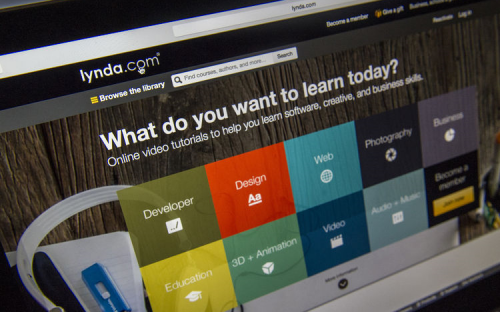The announcement by LinkedIn that it intends to host business courses on its site by acquiring online learning platform Lydna.com for $1.5 billion is one of the latest signs that tech groups are encroaching into the world of education.
For many industry executives, the notion of a professional leaving the workforce for years on end to earn a degree is a doomed model.
“In [a] very short [amount of] years people will think it’s quaint that students quit their jobs to improve their career,” says Rob Cohen, president and chief operating officer of 2U, an education tech company that floated on Nasdaq last year and has a market cap of $1.5 billion.
Also nibbling at the fringes of universities and business schools are the providers of Moocs, or massive open online courses, which have amassed millions of users in just a few years of existence.
Market leader Coursera breached the 15 million user mark this month. Julia Stiglitz, director of business development at the Silicon Valley based company, says: “Online learning will continue to emerge as a new category that propels lifelong personal and career growth.” She says this is especially true in current market conditions where a skills gap is growing and hundreds of job titles exist today that didn’t five years ago.
Yet responding to the online challenge is hard for universities, which for centuries have led academic excellence from bricks-and-mortar campuses. Many do not want to lose the classroom interaction that has defined their institutions.
“People who have thought more about this than I have had said yes, there is some threat to the traditional university model,” says Anne Trumbore, director of Wharton Online, the elite business school’s digital initiative. “[But] I don’t think anything is ever going to replace sitting in the classroom with an instructor physically present. That will always be highly valued.”
The online revolution, however, trundles on. Between January and June, $2.5 billion was invested into education technology, eclipsing the record high $2.4 billion invested in the entirety of 2014, according to market research firm Ambient Insight.
A wave of disruptors have emerged, seeking to capitalize on the relatively slow adaption of traditional universities to the digital era. Coursera, Udacity, and edX in particular have gained stardom in the education community.
Business schools say that by partnering the very forces that are seeking to supplant them, they are able to open up new global audiences. Also, by teaming up with tech groups like 2U they are able to tap into cutting edge learning technologies.
For instance, Coursera announced a clique of courses developed with top business schools including Wharton, UC San Diego, ESSEC, Michigan Ross and Darden earlier this month, all hosted on its platform.
University of Illinois’ College of Business launched in May an “iMBA” program made up of a series of Moocs and costing one-third of a traditional version of the degree.
Harvard, which recently launched HBX Live — a virtual classroom designed to reproduce synchronous interaction online — hosts Moocs on edX ranging from medieval liturgy to emerging economy entrepreneurship.
Susan Cates, executive director of the online MBA at UNC’s Kenan-Flagler Business School, says blended campus and online learning is an essential evolution for schools.
Yet there is no ideal model for the business education industry. “We believe we are still in the early days of great online education,” she says.
Nonetheless the growth of online learning has been rapid, fuelled by increased usage of mobile and tablet devices.
“Mobile usage of the platform is growing rapidly and outstripping desktop usage,” says Simon Nelson, chief executive of FutureLearn, the online learning company that has totalled two million users.
He says we are just at the beginning of exploiting the potential of mobile, which is “critical to the growth of the whole online learning market”. “Audiences expect to be able to learn in the same way as they consume their media and engage with each other,” he says.
Growth of mobile adoption is increasingly rapid in emerging market countries such as in Africa and across the Middle East — markets that both schools and digital start-ups are keen to reach.
Mike Feerick, CEO and founder of ALISON, says the online learning business with five million students is seeing significant growth in India, Latin America, and African nations Nigeria, Egypt and South Africa.
“In 2000, there were approximately five million mobile phones in Africa. Today there are about 900 million,” he says, adding that 23% of learners this year accessed ALISON via a mobile device, up from 12% a year ago.
The digital education push comes at a time of waning demand for traditional business courses, such as US business school staple the MBA.
As the market heavyweights are weighed down by tradition and in some cases opposition from their own academics, they have become vulnerable to competition from high-tech start-ups.
The founders of these companies see business schools as slow-moving and complacent, although many recognize collaboration is essential for their own survival.
Top schools have changed their attitudes to the disruptors. Whereas the internet was once seen as the enemy, universities have come to realize that the two need to work together.
“We have continued to evolve our delivery as technology and other tools have changed,” says Ash Soni, executive associate dean at Indiana’s Kelley School of Business. “Like many businesses, we are continuously innovating and evolving, and strive toward creating the ideal model.”
Fledgling tech groups are equally keen to work with traditional academic institutes. Oliver Cameron, VP for engineering and product at Udacity, says: “We expect online education and traditional education to coexist, supplement, and increasingly intertwine with one another in the coming decades.”
“Already many college courses are offered online,” he adds, citing universities including Georgia Tech and businesses that have developed programs, such as AT&T, Google, and Facebook.
Nancy Moss, director of communications at edX, says that while Moocs offer additional pathways to education, they won’t replace universities: “Online learning is not a zero sum game.”
“We are creating a selected network of the world’s top schools,” she says, adding that on-campus courses can leverage the power of Moocs by freeing up classroom time for interactive collaboration.
Coursera’s Julia is equally keen on academic partners. The company works with business schools including IE, Yale and Duke Fuqua.
“Traditional degrees will remain as relevant and important as ever for the foreseeable future,” she says. “But online learning will continue to emerge as a new category.”
RECAPTHA :
26
c7
4c
cb







